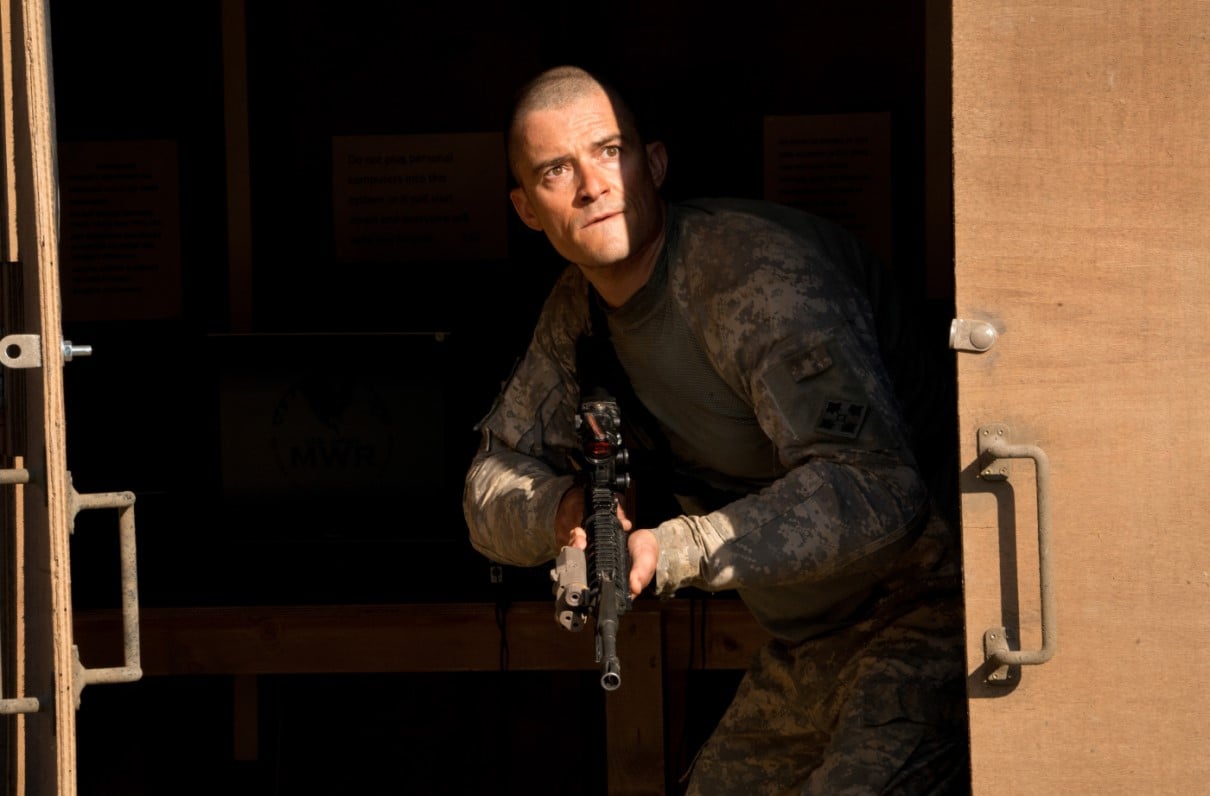Army 1st Lt. Benjamin Keating knew the armored supply vehicle was too heavy for the road in Kamdesh, a remote town in eastern Afghanistan, so he went against regulation that day in 2006 took the wheel.
The road collapsed, tossing Keating from the truck as the Landay-Sin River sucked him under, according to reports. His death had a profound effect on his platoon, while demonstrating the tremendous care he had for his soldiers.
“Lt. Ben Keating was an example of a good leader who took responsibility and lived among his men and for this men and not above them or looking down on them,” said acclaimed actor Orlando Bloom, who portrays Keating in the new military thriller The Outpost.
Bloom spoke to Military Officer about his role as Keating and how he trained with the Army. The performance comes nearly 20 years after one of his first film roles as a professional actor – a brief appearance as an Army private first class in Black Hawk Down.
[RELATED: Tom Hanks talks 'Greyhound']
The Outpost, based on the namesake book by CNN correspondent Jake Tapper, is available for rent or purchase on several streaming platforms, including iTunes, Prime Video, and most cable providers. Here’s more from the actor:
Q. How did you prepare for this role? Did you talk to soldiers or observe Army training?
A. I was fortunate to have had very extensive boot camp training at Fort Benning in preparation for my role in Black Hawk Down. Whilst that was some years ago, all of the training came back quickly. We had military advisers on set, some of whom actually portrayed characters in our film.
Q. What were the challenging and surprising parts of playing a military officer, versus some of your other film roles?
A. There is of course a code of conduct, a code of honor if you like, a sense of responsibility for their fellow officers that exist in the service. There is a sense of teamwork and building relationships and a bond that may ultimately save your life. It's hard to articulate, but it’s a quality I admire greatly. And if you are someone who works in the service, I think you know what I'm talking about. That quality isn’t always present in other characters. Lt. Ben Keating was an example of a good leader who took responsibility and lived among his men and for his men and not above them or looking down on them.
[RELATED: Jon Stewart Continues Advocacy Efforts on Behalf of Veterans Exposed to Burn Pits]
Q. How did this role shape or change your understanding of the military?
A. It's very apparent in the script, and I hope for those of you who watched the film, that the sensitivity with which we approached the story showed a deep respect for our men and women who serve their country. It's hard not to respect the remarkable work and the insane circumstances that these men and women find themselves in. ... The Battle of Kamdesh, after all, was one of the bloodiest battles in this ongoing 19-year war. These are everyday heroes putting their lives on the line, taking orders from the top to serve their country, believing and trusting what they are doing is part of their commitment to their country, work and families.
Q. How do you hope this film shines a light on military service?
A. I hope that The Outpost shows the human side of war and combat, which often is impossible for civilians to understand.
Q. Almost 20 years ago, you played a role as a soldier in Black Hawk Down. Was there any experience from your time in that role that you pulled from and applied in your role as 1st Lt. Keating?
A. The boot camp training I had at Fort Benning was something I’ll never forget as an experience in discipline, pushing the boundaries, and working as a team. That obviously parlayed very well.
Support The MOAA Foundation
Donate to help address emerging needs among currently serving and former uniformed servicemembers, retirees, and their families.

